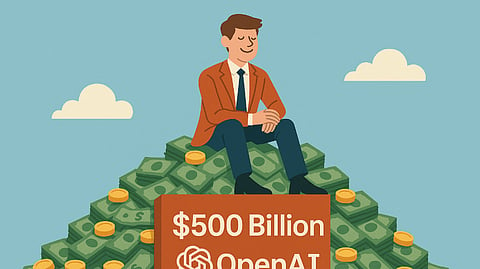OpenAI at $500 Billion: Can the AI Giant Live Up to Its Own Hype?
The $6.6 Billion Liquidity Moment
OpenAI has just completed a staggering $6.6 billion secondary share sale that pegs its valuation at an eye-watering $500 billion. Reuters reported details of the stock sale earlier in August. This isn’t fresh funding. Instead, it’s a liquidity event—an opportunity for current and former employees to cash out a portion of their holdings.
Think of it as an IPO-lite: the insiders pocket some money, while OpenAI remains a private company. For those who’ve been on the rocket ship since ChatGPT’s debut, the timing couldn’t have been better. What makes this moment remarkable is not just the number, but the velocity at which it was reached. Less than a year ago, OpenAI was valued at $300 billion, and within months, its valuation had leapt by two-thirds,
This sudden escalation demonstrates how quickly the artificial intelligence sector has moved from fringe fascination to the epicenter of global economic imagination. In this sale, OpenAI effectively allowed insiders to realize wealth while still maintaining control of the narrative, and the broader tech world is watching closely. Secondary share sales, often misunderstood outside of finance, offer liquidity without dilution, meaning OpenAI’s war chest didn’t grow, but its reputation did. That in itself speaks volumes about how investors view its future.
How OpenAI Leapfrogged Into the Stratosphere
Earlier this year, OpenAI’s valuation sat around $300 billion. Fast forward just a few months, and the company has leapfrogged past SpaceX (valued at around $400 billion) to become the world’s most valuable private company. Major buyers in the deal included SoftBank, Thrive Capital, Dragoneer, Abu Dhabi’s MGX, and T. Rowe Price, underscoring deep-pocketed institutional belief in the company’s trajectory. For context, few private firms in history have seen such dramatic reappraisals outside of IPO surges.
SpaceX had years of contracts, launches, and industry dominance before achieving its rank, while OpenAI, propelled by ChatGPT’s cultural ubiquity, has rocketed ahead in what feels like record time. It’s not only about financials; it’s about momentum and mindshare. The valuation itself has become symbolic, a declaration that artificial intelligence is no longer niche—it’s the foundation of the next economy. With such a leap, OpenAI is no longer just a company; it has become the benchmark by which other AI firms, from Anthropic to Mistral, are judged. This leapfrogging suggests that venture capitalists and sovereign wealth funds alike see generative AI not just as transformative, but as inevitable.
Why This Isn’t Just About the Money
The mechanics of this sale matter as much as the headline number. Unlike a new funding round where capital flows into company operations, this was existing shareholders selling to new investors. That means OpenAI’s coffers didn’t grow, but its employees gained life-changing liquidity and psychological safety.
Many chose to hold onto their stock, signaling long-term confidence in the company’s trajectory. This distinction makes the move more about trust, retention, and sustainability than immediate capital injection. In a market where top AI researchers and engineers are being wooed by rivals such as Google DeepMind, Meta, and Anthropic, providing employees the chance to secure generational wealth without leaving the company is strategically brilliant.
OpenAI, by opening this window, buys loyalty. It tells its workforce: you can benefit now without sacrificing later. It also keeps the IPO option on the table but avoids the intense quarterly pressures and regulatory scrutiny that come with going public. The move is as much about culture as finance, positioning OpenAI as not only an innovation hub but a place where extraordinary work translates into extraordinary reward.
The Half-Trillion-Dollar Question: Is It Sustainable?
Critics aren’t wrong to ask whether the valuation matches reality. Training frontier AI models costs billions annually in compute and infrastructure. OpenAI reportedly spends enormous sums renting and operating vast arrays of GPUs and custom chips, an expenditure that will only balloon as models grow more sophisticated. Regulatory scrutiny is also mounting: Europe is pressing for greater transparency, the U.S. is eyeing security and antitrust implications, and countries like China are building rival ecosystems at breakneck speed. And competition is accelerating. Anthropic, with its Claude models, Mistral in Europe, and a revitalized Google, are all charging hard to chip away at OpenAI’s perceived dominance.
Still, OpenAI has something its rivals lack: cultural supremacy. “ChatGPT” has become a verb, a brand as sticky as Google once was. That mainstream familiarity translates into market advantage. Enterprise adoption of GPT-powered tools is accelerating, and the more OpenAI is embedded into workflows, the harder it becomes to dislodge. The real question isn’t whether $500 billion is too high today—it’s whether OpenAI can turn cultural dominance into durable profit margins tomorrow.
What’s Next on the AI Horizon
Does this valuation signal an IPO within the next 24 months? Possibly. But OpenAI may also follow SpaceX’s playbook, remaining private while offering periodic liquidity windows to insiders. For investors, that would mean a long wait before a public debut, but it also allows the company to operate with fewer constraints. In the meantime, the focus will likely center on scaling enterprise adoption, refining its AI platform into a sticky ecosystem that goes beyond ChatGPT, and aggressively fending off challengers.
That means partnerships, acquisitions, and continued dominance in the enterprise productivity space. It also likely means lobbying, as regulatory regimes begin to tighten around the use and risks of advanced AI. What is certain is that OpenAI’s rise cements generative AI as not just a tech fad but as a defining economic and cultural force of this decade.
Inspired by what you read?
Get more stories like this—plus exclusive guides and resident recommendations—delivered to your inbox. Subscribe to our exclusive newsletter
Resident may include affiliate links or sponsored content in our features. These partnerships support our publication and allow us to continue sharing stories and recommendations with our readers.

